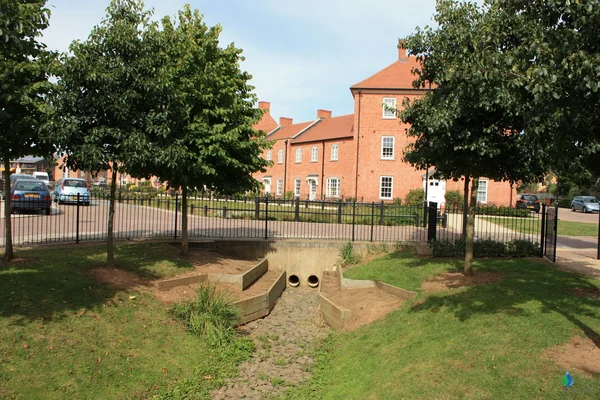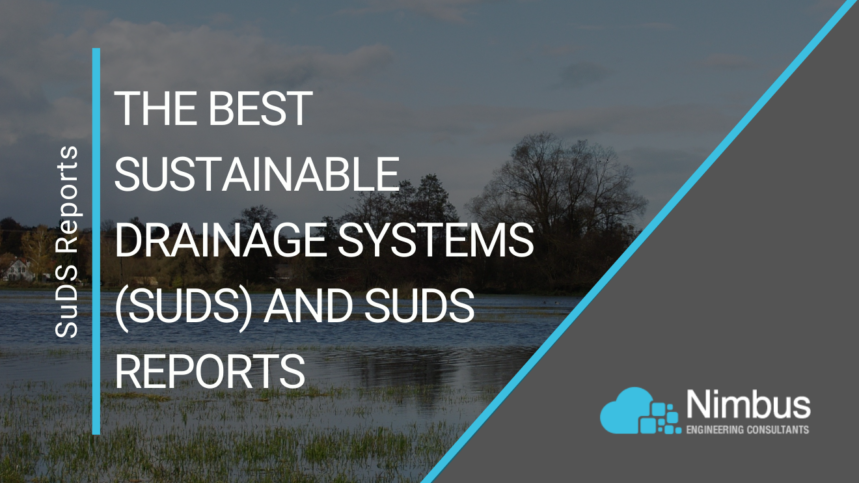When you’re in the process of starting a new construction project, as you well know, there’s a lot of paperwork to deal with, reports to process, and authorities to contact.
Sustainable urban drainage systems or SuDS is just one of those important factors to consider and for most projects, regardless of size, a SuDS report is required. Helping to manage surface water runoff, SuDS helps to reduce the risk of all types of flooding, from surface water to fluvial and tidal.
As recently as 2015, it became compulsory for sustainable urban drainage systems (SuDS) reports being completed at the planning stage of certain types of developments. This is added to the likely request from Lead Local Flooding Authorities (LLFAs), who will want to see the SuDS report and proposed drainage strategy, either at the planning application stage or before any groundwork or construction can commence.
With that in mind, we thought it would be important to discuss SuDS reports in more detail and highlight what exactly they involve. As well as answering these FAQs, we’re also providing you with some points that will ensure that you receive reports of the highest possible quality, in order to ensure there are no delays to your project.
The Purpose of A SuDS Report
Carried out during the planning application stage, a sustainable urban drainage system report (or SuDS report), is required to ensure that designers and developers have considered the surface water run-off arising as a result of their development proposals.
Preventing flooding in new developments and in the surrounding area is critical. What the SuDS report does is ensure that the developers have explored all the drainage possibilities through a recognised SuDS design consultancy.
Because they are crucial in the planning stage of any construction project application, it’s important to get a SuDS report done correctly. In doing this, you will have a much smoother planning process that avoids delays, obstructions, and rising costs.
When Do You Need A SuDS Report?
A SuDS report is required at various stages depending on the type of project, and it’s important to consider this when approaching a new project.
One of the most obvious times a SuDS report is required is during the planning and preliminary stages of a construction project. Having a SuDS report helps to validate the application, showing that you have considered things such as a flood risk assessment and drainage strategies.
SuDS reports are also required to discharge any pre-commencement planning conditions relating to surface water runoff and SuDS, and can also be provided to gain valuable BREEAM credits.
If you’d like to speak more and find out if your project requires a SuDS report, then you can speak to our expert team of design consultants to find out more.
Do I Have To Have A Suds Report?
A SuDS report is a compulsory requirement for planning applications of any major developments and has been since 2015.
There are some deviations depending on where your project is being built, however. In Wales, for instance, construction work can’t begin until a sustainable urban drainage system has been approved.
Essentially, if you want your project to run smoothly, without any time, cost or paperwork delays, it is critical to get a comprehensive SuDS report completed sooner rather than later.
You can find out more about SuDS report requirements by speaking to our expert consultants.
Getting The Best SuDS Report
So, with everything you need to know about sustainable drainage systems explained, now you’ll want to know what makes every SuDS report different.
In this next section, we’ll explain the approaches to creating a SuDS report and discuss the experience that consultants should have in order to make your report far more beneficial to your project.

Long Term SuDS Report Creation
SuDS reports can be a long, complicated process, and for the sake of simple operation, you want it to be as quick and easy as possible.
That way, not only do you have peace of mind that all the important parts of the planning stage are taking care of themselves, but it also helps improve the efficiency of your construction project.
When looking for SuDS design consultants and those that can create reports, it’s important to consider their years of experience in the industry. This experience goes a long way in SuDS reports and flood risk assessments as it shows that they have strong relationships with Lead Local Flooding authorities, helping to streamline the process, as well as the years of industry experience allowing them to understand changes in technology and changes to planning requirements.
SuDS Design Consultants Should Set & Stick To Deadlines
Deadlines are critical in all construction projects, no matter what stage the project is at. Whether at the planning stage, breaking ground or first fit, meeting deadlines is essential and helps build strong relationships across the project.
Finding a SuDS consultant that has repeat customs shows that they constantly meet deadlines and are a team that you can trust.
If you know what the consultants say is true and that they’re going to get things completed when they say so, you’re already on the right path.
Meeting deadlines is key but so is responding to planners in haste. With experienced SuDS consultants, issues and queries should be dealt with quickly and efficiently, so that your project can continue without minimal disruption.
At Nimbus Engineering, 90% of our work is from repeat clients, which goes to show that these relationships are built on trust and providing a quality SuDS and flood risk assessment service.
Push Back To Flooding Authorities
There is a solution to every issue that might arise during the planning application stage.
However, these issues can easily be avoided when you work with a consultant who has expertise in the field and works regularly with the Lead Local Flooding authorities, UK-wide.
Quite often, a sustainable urban drainage system that has been proposed and passed at the planning stage isn’t actually feasible on-site, despite already being approved by the authorities. This can be down to a range of things from site constraints once the work has started to the topography of the site.
As we are Civil Engineers, and Environmental consultants, we don’t only propose a solution that will pass, we also look at the feasibility of constructing the proposed solution on site.
In this situation, it’s important to consider consultants who aren’t scared to push back against the authorities to ensure the proposals are correct, feasible to construct and safe. Knowing that the team that you get your SuDS report from will see through every stage of the implementation period is crucial in relationship building, project efficiency and of course SuDS problem-solving.
This can be achieved by choosing engineers who know exactly what they are doing when it comes to SuDS.
Consider Civil & Environmental Experience
You might think that it’s important to consider consultants with an environmental engineering background.
Of course, that is important, but what you might overlook is someone with civil engineering credentials, too. At the end of the day, SuDS are a civil engineering feat and it’s important to understand whether they are actually buildable from a civil point of view, not just environmental.
In not considering the civil side of things, you could end up with financial implications and time delays, which is why Nimbus Engineering prides itself on its civil and environmental engineering capabilities.
Sustainable Drainage System Reports
SuDS and SuDS reporting is a complex topic that we hope has been tackled in a digestible way in this guide.
In answering questions about SuDS and its importance to your project, we hope you come away with some insight and expertise.
But where should you go when looking for sustainable urban drainage systems?
The second part of this guide highlighted some of the key points to consider when searching for flood risk assessment and SuDS design consultants. In considering things such as experience, engineering capabilities and relationships with the correct authorities, you’ll be guaranteed to have a streamlined approach to your process.
If you’re still looking at having questions, concerns and queries surrounding SuDS, SuDS reports, SuDS designs or further consultation, don’t hesitate in reaching out to our expert team.


